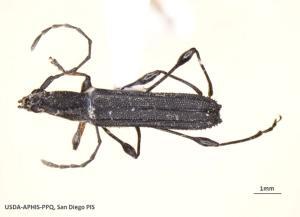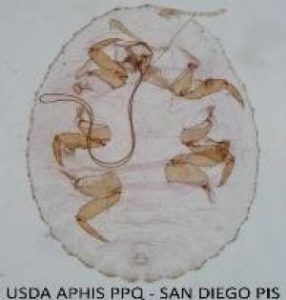Jul 12, 2022Customs officials halt pests at San Diego border crossing
U.S. Customs and Border Protection agricultural specialists recently intercepted two pests entering California from Mexico that were determined to be rare findings.
The agricultural specialists stopped the pests at the Otay Mesa crossing in San Diego.


The first pest was found May 29 in a shipment of flowers, according to Customs and Border Protection. An agricultural specialist with the agency found a live beetle on a plant sent it to the U.S. Department of Agriculture’s Animal and Plant Health Inspection Service (APHIS). APHIS’ Plant Protection and Quarantine (PPQ) identified it May 31 as a member of the Cerambycidae (longhorn beetle) family, probably Dihammaphora hispida.
APHIS designated the beetle find as a “first in port” and “first in nation” interception.
All known longhorn beetle larvae feed on plant tissue such as stems, trunks, or roots of both herbaceous and woody plants, often in injured or weak trees. The larvae bore into wood, where they can cause widespread injury to either living trees or untreated lumber, causing extensive economic damage.
On June 22, a shipment of rambutan fruit arrived at the Otay Mesa Cargo Facility. Customs and Border Protection officers referred the shipment for further agricultural inspection. During the inspection, an agricultural specialist with the agency discovered three specimens of Pseudococcidae. The specimens were submitted to local APHIS PPQ and were then referred to a specialist for identification.


Many species of Pseudococcidae, also known as mealybugs, are considered pests because they feed on plant juices of plants and trees and act as a vector for several plant diseases.
On June 24, an APHIS PPQ specialist identified two of the three species of Pseudococcidae as Maconellicoccus hirsutus and Paraputo larai. They also confirmed the Paraputo larai as a “first-in-port” interception of this species. In recent years, some of the mealybug species have become invasive pests, posing a great problem to the new agro-ecosystems.
“I praise our CBP agriculture specialists for being vigilant and for preventing these pests from entering our beautiful country which could have caused a major economic disaster,” Anne Maricich, CBP deputy director of field operations in San Diego, said in a news release. “Our CBP officers and agriculture specialists work diligently to fulfill CBP’s mission and protect our country from harm, including those hidden threats that could damage the U.S. agriculture, our natural resources and our economy.”
Both trucks and their shipments were returned to Mexico by CBP as a precautionary measure.














